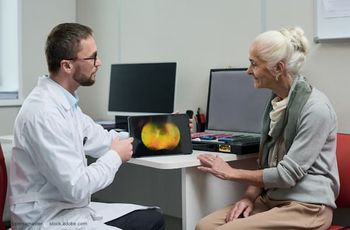
COPHy 2023: Weighing the merits of offering teprotumumab for all patients with thyroid eye disease
Pedro Fonseca, MD, Coimbra Hospital and University Centre, Portugal, and Andrew G. Lee, MD, Blanton Eye Institute, Houston Methodist, Texas, USA, discuss the various pros and cons of offering teprotumumab for all patients with thyroid eye disease.
Pedro Fonseca, MD, Coimbra Hospital and University Centre, Portugal, and Andrew G. Lee, MD, Blanton Eye Institute, Houston Methodist, Texas, USA, discuss the various pros and cons of offering teprotumumab for all patients with thyroid eye disease. The two ophthalmologists highlighted these perspectives with Sheryl Stevenson, Group Editorial Director, during the 14th annual Congress on Controversies in Ophthalmology in Lisbon, Portugal.
Video transcript
Editor’s note: This transcript has been edited for clarity.
Sheryl Stevenson: We're joined today by Dr. Fonseca at this year's Controversies in Ophthalmology meeting from Portugal. We're delighted to have you. As part of the debate that we're talking about today, you will be presenting the 'yes' side of the argument: Should all patients with thyroid eye disease be offered teprotumumab? We'll also have Dr. Andrew Lee presenting later the opposing side, the 'no' side. So we'd love to hear a couple of summaries of what you'll be talking about from the 'yes' side of the argument.
Pedro Fonseca, MD: Thank you, Sheryl. In my presentation, I'm going to talk about teprotumumab, which is a new treatment for thyroid eye disease. As you know, thyroid eye disease can lead to blindness and have a great impact in the quality of life of patients. It starts as an acute inflammatory disease, and it evolves over a couple of years to chronic stage in which eyelid retraction, proptosis, and double vision may persist and in many cases will need surgical treatment. During this active stage, several treatments may be tried, including...steroids. However, patients many times have to wait for years, and sometimes up to 5 years, to have surgery. Even surgery in many patients is far from being successful.
Teprotumumab, this new drug, is a monoclonal antibody that targets the IGF-I receptors in the orbital fibroblasts. In addition to decreasing inflammation, it also prevents fat tissue deposition and muscle remodeling. Because of these effects, it indeed reverses the orbital manifestations of Graves disease, including proptosis and diplopia. But it also improves the periocular inflammation and also the eyelid retraction. Although teprotumumab does work in mild thyroid diseases well, it works especially well in patients with moderate to severe disease, and especially patients with diplopia and double vision. In these patients teprotumumab has been a game changer. For example, the improvement in proptosis is comparable to that of orbital wall decompression.
However, despite these very impressive clinical results, more data are needed on long-term outcomes, also on the need for retreatment, and also in the profile of side effects, which are quite frequent. Up until now they are generally mild and over 90% of patients can complete the treatment course. There is still much to learn about teprotumumab and the exact role of the drug in the treatment of thyroid eye disease. But this therapy has already been a game changer on how we are able to effectively treat patients with thyroid eye disease.
Stevenson: What would be the take home message for clinicians and the impact of this for their patients?
Fonseca: The take-home message is that up until now, the treatments that have been available are sometimes disappointing, and teprotumumab seems to be the first route that really reverses the course of treatment. It has some issues, especially concerning the cost of treatment, which is still very high. But on the whole, I think it opens a pathway to change the course of the disease in many patients that really need that.
Stevenson: Thank you so much for your insights. Very valued.
We're joined today by Dr. Andrew G. Lee, delighted to have you with us. As you know, the program involves a lot of debate. We've already heard from Dr. Fonseca regarding the 'yes' side of the argument and want to take a couple minutes and hear the opposing view from your perspective. Could you give us a little summary of your presentation?
Andrew G, Lee, MD: Yeah, sure. Happy to. Teprotumumab, as you probably heard from Dr. Fonseca is a monoclonal antibody, and it's used for thyroid eye disease. It's got a unique mechanism of action because its target is the actual fibroblast in the orbit, and it blocks IGF-I so that is a very attractive target because it can reduce proptosis, which is the bulging of the eye, and it can attack directly the underlying fundamental mechanism of thyroid eye disease including the double vision, the bulging eye, and potentially the loss of vision which is caused by big muscles as well or from big fat in the orbit compressing the optic nerve.
The reason it shouldn't be offered to every patient is because the clinical trials that prompted the approval of the drug had very specific indications. And so it's very premature to say that it can be extended to all patients with thyroid eye disease, because we really don't know that yet. So that we know that it reduces proptosis. There are very dramatic pictures that show the reduction in the proptosis. It's not as clear how much efficacy it has for the other things, which is compressive optic neuropathy, which is vision loss, even though there is some emerging evidence for that. The standard for that is steroids and surgical decompression, if you have an active, acute compressive optic neuropathy. And so those patients clearly there's some possible role for teprotumumab. But right now, the old standbys are still what we would go to first and the double vision, so I think it does help, but it's probably not the same as surgery.
So teprotumumab is a new medical therapy. It could be considered in all the places we would use conventional steroids, both in the active and in the chronic forms of thyroid eye disease, but I don't think we're ready to give up the knife yet. And so some things just need the knife. And for me, it's unknown whether teprotumumab should be offered to every patient, even though it certainly could be offered to every patient. Could and should are not the same thing.
Stevenson: What is your take home message for clinicians?
Lee: I think that teprotumumab adds to our current arsenal of treatment options. It's probably going to be as good as steroids without all the bad side effects. Its main drawbacks are cost and the infusion and the time and logistics for getting approvals, etc. It's probably not ready to replace strabismus surgery. It's probably not going to replace surgery of the lid because the lid retraction doesn't normally respond as well to teprotumumab. It probably isn't going to replace decompressive compressive optic neuropathy cases and thyroid eye disease because of the speed that we need to get going on some of these acute cases. It shouldn't be offered to all or every patient at least based on our current knowledge base.
Newsletter
Keep your retina practice on the forefront—subscribe for expert analysis and emerging trends in retinal disease management.


































